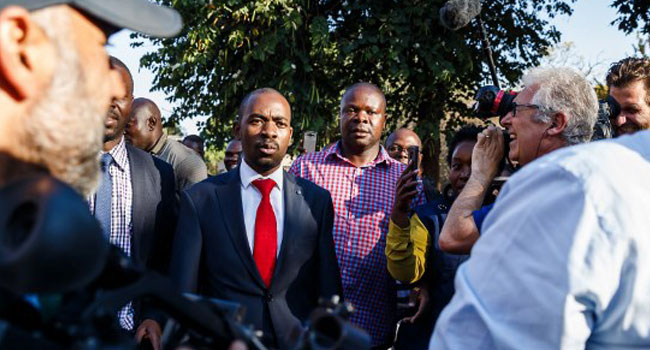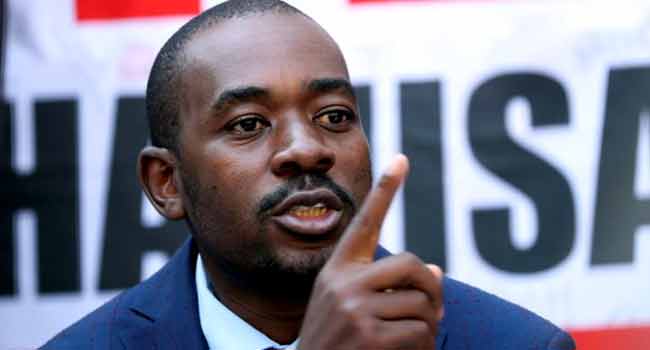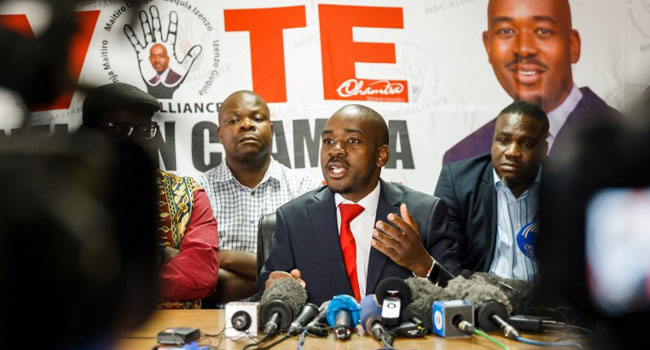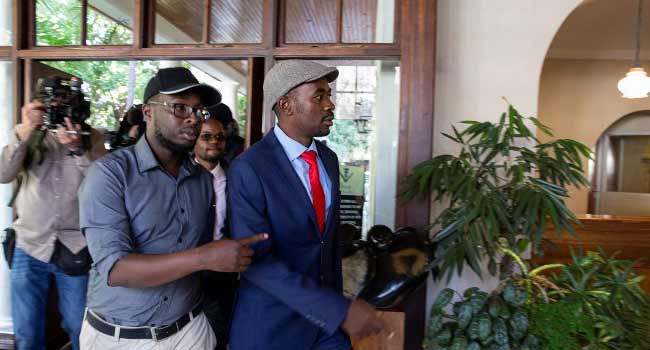
Members of Zimbabwe’s defeated opposition party appeared in court Saturday on violence charges, a day after President Emmerson Mnangagwa was declared the winner of the historic first elections following the downfall of Robert Mugabe.
Mnangagwa, a former Mugabe ally, has called for unity after presidential rival Nelson Chamisa rejected the results, insisting he was the real winner of an election marred by a deadly crackdown on opposition supporters.
At least six people died after troops in the capital Harare opened fire on demonstrators Wednesday, sparking an international outcry and raising grim memories of post-election violence under Mugabe’s repressive rule.
Mnangagwa has accused Chamisa’s opposition Movement of Democratic Change (MDC) of fomenting the unrest but said he would set up an independent commission to investigate the killings.
The 24 opposition members appearing in court were charged with “public violence” during the protests, accused of smashing windows at offices of the ruling ZANU-PF party, throwing stones and setting fire to vehicles.
A magistrate told the packed Harare courtroom the tribunal was “overwhelmed” and that the case would be postponed until Monday.
Defence lawyer Denford Halimani said the 16 men and eight women had been caught up in an “opportunistic dragnet” against the opposition.
Mnangagwa has insisted that Monday’s landmark election was “free, fair and credible”, and has called for national unity as he pushes for an end to Zimbabwe’s international isolation.
International observers praised the peaceful conduct of the vote, though EU monitors said Mnangagwa enjoyed an “un-level playing field” including heavy state media coverage.
‘They cheated’
Mnangagwa won 50.8 percent against Chamisa’s 44.3 percent, according to official results — just enough to avoid a presidential run-off.
Chamisa, a 40-year-old pastor and lawyer, has urged his supporters to refrain from violence as he prepares to challenge the results in court.
“We won but they declared the opposite. You voted but they cheated,” he said on Twitter on Saturday.
Mnangagwa, 75, has said Chamisa is free to mount a legal challenge, though such a move appears to have little chance of changing the result.
A former right-hand man to Mugabe, Mnangagwa was chosen to lead ZANU-PF after the brief military intervention last November that ousted him after 37 years in power.
Mnangagwa was allegedly involved in state violence during the 2008 elections when the opposition pulled out of the run-off, following the deaths of at least 200 supporters in attacks.
He has hailed this week’s polls as a “new beginning” and pledged to represent all Zimbabweans, including those who did not vote for him.
But rights groups have expressed concern that heavy-handed policing to prevent more opposition protests is a sign of how he intends to govern.
Amnesty International said more than 60 people had been “arbitrarily arrested” in a post-election clampdown on the opposition.
Former colonial power Britain said it remained “deeply concerned by the violence following the elections and the disproportionate response from the security forces”.
Overnight, residents said they had seen troops beating up civilians in Chitungwiza, a sprawling satellite town south of Harare.
“I don’t even know why they were beating those people,” said Christine, a retailer of copper products in Harare who witnessed the beatings.
“It was the soldiers, they are still out there. We are even scared of going out.”
Investment push
Seeking to lift Zimbabwe’s pariah status, Mnangagwa has made a priority of attracting badly needed foreign investment.
He pronounced the country “open for business” on Friday, adding: “We want to leapfrog and catch up with other developing countries.”
Mugabe, who had ruled since independence from Britain in 1980, left Zimbabwe’s economy in tatters, presiding over the seizure of white-owned farms and hyperinflation.
Health and education services are in ruins, while millions of people have fled abroad to seek work.
Anthoni Van Nieuwkerk, an international relations professor at Wits University in Johannesburg, said Mnangagwa was well aware that his recovery plan required “goodwill and support” from the international community.
“If they roll out the soldiers — beyond what happened on Wednesday — throughout the country to suppress dissent, and if more people are killed, then this will spell no good news for this new incoming president,” he told AFP.
South Africa’s President Cyril Ramaphosa was the first key partner to congratulate Mnangagwa, calling on all Zimbabweans to accept the result.
The United States, meanwhile, urged Mnangagwa to show “magnanimity” and the opposition to show “graciousness in defeat”.
AFP



